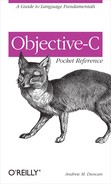Objective-C lets you call methods specified by variables at runtime using
the selector mechanism. Key-value coding is a library facility that puts
field access on the same dynamic footing: you can access an object’s
fields by naming them. For example, you could use the following code to
retrieve the parent field of a window
object:
Window*parentWind= [windvalueForKey:@"parent"];
Because you can pass a string variable to -valueForKey : as well as a literal value, this is another way your
program’s behavior can vary based on values that aren’t known until
runtime.
NSObject implements -valueForKey: method as part of the NSKeyValueCoding category, which declares methods for reading from and
writing to the fields of objects. These methods store and retrieve
Objective-C objects, so their primary use is in accessing objects.
However, even if your fields are integers or other numeric types, you
can still use key-value coding to retrieve and set them. The methods
will take NSNumber objects and
automatically convert them to set numeric fields, and return NSNumber objects when you read numeric
fields.
The key-value methods can bypass the access modifiers of the
static language: you can read and write to private fields as easily as to public ones. This might
seem like a violation of the object’s declared interface. However, you
can prevent key-value methods from bypassing your access modifiers by
overriding +accessInstanceVariablesDirectly to return NO.
In addition, the key-value methods first search for an
appropriate accessor method in your class before attempting to read
from or write to a field directly. For example, the methods that read
a field named field will look for
accessor methods with the following names (the order will vary as
described in the next section):
getFieldfield_getField_field
The key-value methods will take care of uppercasing the first
letter of the field name before prepending get or set.
Note
Although the key-value methods will search for methods or fields whose names start with an underscore, Apple has reserved these names for its internal use. Your classes should not have methods or fields that start with an underscore.
If your class provides accessor methods with the appropriate names, they will be called even if they are private methods not declared in your class’s interface.
The NSKeyValueCoding
protocol declares (and NSObject implements) six methods that let
your objects use key-value coding:
-(id)valueForKey:(NSString*)keyGiven the name of a field, returns the value stored in that field. If
keyis"field",-valueForKey: tries the following ways to get the associated value:Calls
-getField, if it exists.Calls
-field, if it exists.Calls
-_getField, if it exists.Calls
-_field, if it exists.Reads
field, if it exists and direct access is allowed.Reads
_field, if it exists and direct access is allowed.
If all of these fail,
-valueForKey: calls-handleQueryWithUnboundKey: on your object.-(void)takeValue:(id)valueforKey:(NSString*)keyGiven the (pointer to the) object, this method stores the pointer to the object in the field of the receiver named by the key. If
keyis"field",-takeValue:forKey: tries the following ways to set the associated value:Calls
-setField:, if it exists.Calls
-_setField:, if it exists.Sets
field, if it exists and direct access is allowed.Sets
_field, if it exists and direct access is allowed.
If all of these fail,
-takeValue:forKey: calls-handleTakeValue:forUnboundKey: on your instance.- (id)storedValueForKey:(NSString*)keyWorks like
-valueForKey:, but with a possibly different search sequence:If
+useStoredAccessorreturnsNO, the sequence is the same as with-valueForKey:.If
+useStoredAccessorreturnsYES(the default behavior), this method starts searching in reserved accessors (ones starting with underscores) first.
For example, if
keyis"field", and+useStoredAccessorreturnsYES,-storedValueForKey: tries the following ways to get the associated value:Calls
-_getField, if it exists.Calls
-_field, if it exists.Reads
_field, if it exists and direct access is allowed.Reads
field, if it exists and direct access is allowed.Calls
-getField, if it exists.Calls
-field, if it exists.
If all of these fail,
-storedValueForKey: calls-handleQueryWithUnboundKey: on your instance.The alternative search sequence supported by
-storedValueForKey: facilitates using key-value coding for storing and retrieving objects from a database, when you want to bypass public accessors that may have side-effects.-(void)takeStoredValue:(id)valueforKey:(NSString*)keyWorks like
-takeValue:forKey:, but with a possibly different search sequence:If
-useStoredAccessorreturnNO, the sequence is the same.If
+useStoredAccessorreturnsYES(the default behavior), this method starts searching in reserved accessors (ones starting with underscore) first.
For example, if the key is
field, and+useStoredAccessorreturnsYES,-takeStoredValue:forKey: tries the following ways to get the associated value:Calls
-_setField:, if it exists.Sets
_field, if it exists and direct access is allowed.Sets
field, if it exists and direct access is allowed.Calls
-setField:, if it exists.
If all of these fail,
-takeStoredValue:forKey: calls-handleTakeValue:forUnboundKey: on your object.+(BOOL)accessInstanceVariablesDirectlyThe
NSObjectversion returnsYES. Override this in your class to affect the search sequence for the basic methods-valueForKey: and-takeValueForKey:.+(BOOL)useStoredAccessorThe
NSObjectversion returnsYES. Override this in your class to affect the search sequence for the stored methods-storedValueForKey: and-takeStoredValue:forKey:.
The category NSKeyValueCodingExceptions provides three methods for handling failures in the
lookup sequence and other problems:
-(id)handleQueryWithUnboundKey:(NSString*)keyCalled when lookup fails for a getter (
-valueForKey: or-storedValueForKey:) with the provided key. The default version of this method, provided inNSObject, raises anUnknownKeyException. Override this to handle things your way.-(void)handleTakeValue:(id)valueforUnboundKey:(NSString*)keyCalled when lookup fails for a setter (
-takeValueForKey: or-takeStoredValueForKey:) with the provided key. The default version of this method, provided inNSObject, raises anUnknownKeyException. Override this to handle things your way.-(void)unableToSetNilForKey:(NSString*)keyCalled when you pass
nilin to a setter for a numeric field.NSObject’s version raises an exception. Override this in your class if there is a plausible numeric value (zero, or an out-of-band value) to use.
